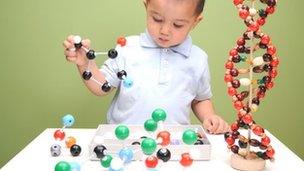Analysis: Human genome hype or reality?
- Published

One day will all children have their genes mapped at birth?
It seems a long time since Tony Blair and Bill Clinton announced the first draft of the human genome had been completed.
Knowing the "genetic blueprint" of human beings promised to usher in a new era of molecular medicine, bringing new ways to diagnose and treat disease, they promised.
Almost 12 years on, you could perhaps be forgiven for thinking it's been a long time coming.
Here's one of the big dreams. One day every newborn will have their entire genetic code mapped.
Then, if a doctor ever needs that information, they can check for secrets to molecular diseases buried in our DNA.
Here's another. A patient is diagnosed with cancer. During their biopsy, a tiny sample of the tissue sent to pathology is used to read all the billions of the genetic letters in the human genome.
A clinician can then use that information to prescribe the right drugs.
The first scenario is a long way off. And it won't mean much unless mass decoding efforts create a database of genomes - a kind of catalogue of human genes - as a reference library.
The second is already happening. But it will be a while before the advances filter through to the majority of NHS cancer patients.
One of the biggest challenges is to bring down the cost - in terms of time and money - of DNA sequencing.
On Monday, the US biotechnology company, Life Technologies, announced what they called "a genetic milestone" - a device that can sequence a human genome in a day or two rather than weeks.
The new sequencer, about the size of a laser printer - costs $149,000 (£96,200).
Dr Jonathan Rothberg, who invented the Ion Proton sequencer, predicts it will be used in a variety of medical settings, including children's hospitals - to see if sick newborns have a known genetic condition, or to look at the myriad genes behind conditions such as autism.
The scientist and entrepreneur told the BBC: "For the first time it will be economical to do whole genome sequencing to address these problems.
"Now we're looking at all six billion letters [of human DNA]. There's a strong belief that by looking at the whole, we'll be able to understand some of these chronic diseases."
Three US medical centres would take delivery of the machine in January, said Life Technologies.
One of them is the human genome sequencing centre at the Baylor College of Medicine in Houston.
Director Dr Richard Gibbs told the BBC: "All of cancer diagnosis and front edge therapy now is turning to the fruits of the genome project.
"We've seen a whole sea change in the field and these machines are putting genomes into the front line in the clinic."
The development will be eyed closely by competitors in the field, who are hot on the heels of Life Technologies.
And this time next year scientists will be seven days in to a $10m contest to map the genomes of 100 centenarians within 30 days in a race they say will benefit humanity.
Given that the first draft of the human genome took 10 years, it would be an astonishing achievement.
- Published15 October 2011